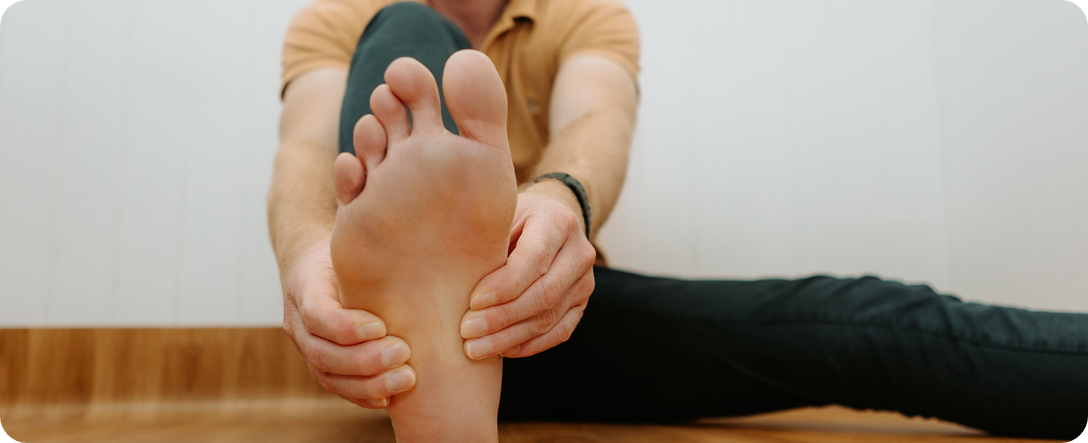Plantar Fasciitis Treatment

Plantar fasciitis is one of the most common causes of heel pain and affects people of all ages and activity levels. It occurs when the plantar fascia, a thick band of tissue running across the bottom of your foot, becomes inflamed or irritated. This tissue connects your heel bone to your toes and plays a crucial role in supporting the arch of your foot. At Podiatry Hub, we specialise in diagnosing and treating plantar fasciitis, helping you regain pain-free movement and get back to your daily activities.
What is Plantar Fasciitis?
The plantar fascia acts like a shock absorber, supporting the arch of your foot. However, when there is excessive tension or stress on this tissue, small tears can occur, leading to inflammation and pain. Over time, this repeated stress can cause the fascia to become irritated, resulting in the condition known as plantar fasciitis.
Symptoms of Plantar Fasciitis include:
Sharp, stabbing pain in the heel, especially when taking your first steps in the morning or after long periods of rest
Pain that worsens after exercise or prolonged standing
Discomfort that is more intense after activity, rather than during it
If left untreated, plantar fasciitis can lead to chronic heel pain and even affect the way you walk, potentially causing other foot, knee, hip, or back problems.
Causes and Risk Factors
Several factors can contribute to the development of plantar fasciitis, including:
Overuse or Repetitive Strain: Activities such as running, jumping, or standing for long periods can place excessive stress on the plantar fascia.
Improper Footwear: Wearing shoes with inadequate arch support, cushioning, or that are worn out can increase your risk.
Flat Feet or High Arches: Both flat feet and high arches can cause abnormal strain on the plantar fascia.
Age: Plantar fasciitis is most common in people between 40 and 60 years old.
Weight Gain: Being overweight puts extra pressure on your feet, increasing the likelihood of developing plantar fasciitis.
Tight Calf Muscles: Tight calf muscles or Achilles tendons can lead to increased tension on the plantar fascia.
How We Diagnose Plantar Fasciitis
At Podiatry Hub, our podiatrists conduct a thorough examination to accurately diagnose plantar fasciitis. This includes:
Discussing your symptoms, lifestyle, and any activities that may contribute to the pain
Examining your foot structure, gait, and posture
Conducting a physical assessment, including checking for areas of tenderness or swelling
In some cases, diagnostic imaging (such as X-rays or ultrasound) may be used to rule out other conditions, such as stress fractures or heel spurs.
Treatment Options for Plantar Fasciitis
The good news is that most cases of plantar fasciitis can be effectively treated with non-invasive methods. Our podiatrists offer a range of treatment options designed to reduce pain, promote healing, and prevent future occurrences. These include:
Rest and Activity Modification
Reducing activities that aggravate your condition, such as running or standing for long periods, can help alleviate pain and give your plantar fascia time to heal. Our podiatrists will guide you on how to modify your activities to minimise stress on your foot.
Custom Orthotics
Custom orthotic insoles can provide support, cushioning, and proper alignment for your feet, helping to reduce stress on the plantar fascia. These orthotics are designed to fit your unique foot shape, providing targeted relief and preventing further strain. By correcting biomechanical imbalances, orthotics can be a key factor in both treating and preventing plantar fasciitis.
Stretching and Strengthening Exercises
Stretching exercises help improve the flexibility of your calf muscles, Achilles tendon, and plantar fascia, reducing tension and pain. Strengthening exercises also help support the arch and prevent the recurrence of plantar fasciitis. Our podiatrists will create a tailored exercise program to address your specific needs.
Footwear Advice
Wearing the right shoes is essential for managing plantar fasciitis. We provide expert advice on the best footwear for your foot type and activity level, ensuring that your shoes offer the necessary support and cushioning to reduce strain on your plantar fascia.
Taping and Strapping
Taping techniques can provide temporary support to the arch of your foot, reducing tension on the plantar fascia and providing relief from pain. Our podiatrists are skilled in applying taping methods that offer immediate comfort and aid the healing process.
Night Splints
Night splints are worn while you sleep to keep your foot in a flexed position, stretching the plantar fascia and calf muscles. This helps prevent the morning pain that is often associated with plantar fasciitis.
Preventing Plantar Fasciitis
Preventing plantar fasciitis is possible by taking a few proactive measures:
Wear supportive footwear that provides adequate arch support and cushioning
Stretch your feet and calf muscles regularly, especially before and after exercise
Avoid walking barefoot on hard surfaces
Maintain a healthy weight to reduce stress on your feet
Use custom orthotics if you have flat feet, high arches, or other foot structure issues
Why Choose Us for Plantar Fasciitis Treatment?
At Podiatry Hub, we understand the impact that heel pain can have on your daily life. Our team of experienced podiatrists is dedicated to providing personalised, effective treatment options to help you recover from plantar fasciitis and prevent future episodes. We use the latest techniques and technologies to ensure you receive the best possible care, guiding you every step of the way on your journey to recovery.
Take the First Step Towards Pain-Free Feet
Don’t let plantar fasciitis hold you back from enjoying your life. If you’re experiencing heel pain or suspect you have plantar fasciitis, schedule an appointment with one of our skilled podiatrists today. We’ll help you find relief and get you back on your feet as quickly as possible! Contact us now to book your consultation and start your journey to recovery.
<–Sports Injury Treatment (including Football)
Orthotic Therapy ->
